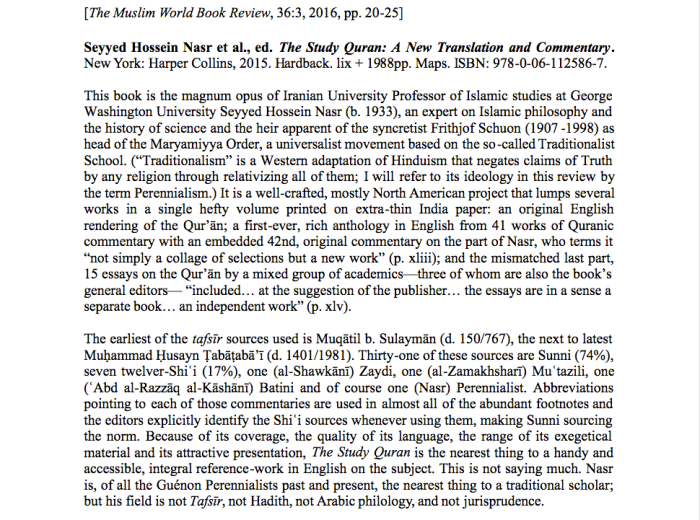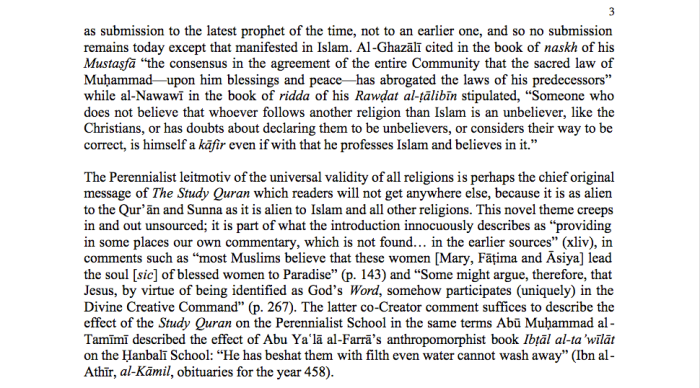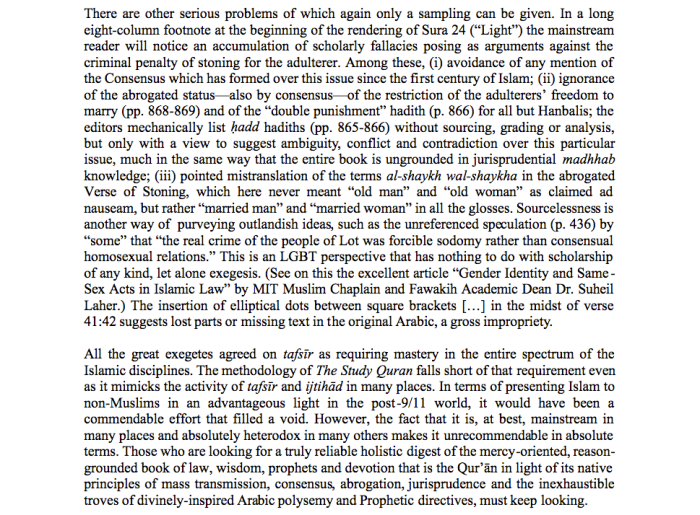Shaykh Dr Gibril Haddad (born in Beirut, Lebanon, 1960) is an influential Islamic scholar, religious leader, author, and Arabic translator of classical Islamic texts. He embraced Islam while a graduate student in French Literature at Columbia University in New York. The Study Quran can be viewed here. Click on the screen prints below for greater viewing clarity.
- Comment
- Reblog
-
Subscribe
Subscribed
Already have a WordPress.com account? Log in now.









Shaykh Haddad is an indispensable scholar. I love his writings.
LikeLiked by 1 person
What do you think of his book review?
LikeLike
I haven’t read it in its entirety yet but his critique of Nasr’s perennialist background is good.
LikeLike
I just glanced at Shaykh Haddad’s review.
His criticism seems to be based on a deep and considered reading.
I do not want to make any judgements on his review but I appreciate his contribution.
I agree that some of his comments are “devastating” to many points in The Study Qur’an such as “It is like the amoralist saying it is God’s will for there to be evil.”
However, I still see value in The Study Qur’an as I see itin many commentaries
I don’t like taking any commentary as final….I like reading many of them to learn the different shades of meaning that the Wise Qur’an imparts to readers ready to listen well.
I think it is a little dangerous for any Muslim to rely on only one commentary.
I did not read all or even most of the commentaries but my favorite commentaries so far is Muhammad Asad and Abdullah Yusuf Ali.
Thanks Paul for posting this book review.
LikeLiked by 2 people
I agree brother Omer. We shouldn’t rely on any one commentary. I also like Asad and Ali’s commentaries, but they also have some weaknesses.
LikeLike
thanks Omer. I particularly appreciate Shaykh Haddad’s criticism of the Perennialist bias of the Study Quran.
LikeLike
Thanks for letting us the view if Sh. Haddad. This help us understand the intricate nuances of Islamic scholarship.
LikeLiked by 1 person
Seems like the best review there is on the book, namely due to actually expounding on not only what Perennialism is but also how it’s visible in The Study Quran’s attempts at explanation in certain and various areas. Feels like this is what people call “‘the’ review” to share on the book.
I think I’ll continue sticking to Ahmad Zaki Hammad’s translation. Both wonderful to read and accurate in its translation, and approved here https://bilalaliansari.com/2012/09/03/the-gracious-quran-my-preferred-translation-of-the-qurans-meanings-in-english/. It did sound too good to be true that a single volume of both a superb translation and magnificently huge yet diverse and true, orthodox commentary would exist now. Gotta go the hard way and read/learn more from reputable scholars and books.
LikeLiked by 1 person
Thanks
LikeLike
Ahmad Zaki Hammad’s translation can be read online, and downloaded from, the Internet Archive –
https://archive.org/details/01114TheGraciousQuranComplete
LikeLike
Too polemical.
LikeLike
Sh Haddad is expecting too much from a “human endeavor” and ALL Tafsir or compilation of Tafsirs are human endeavors. No one was expecting a replication of the complexity or uniqueness of the original (arabic) Quran in a Tafsir…
To make suspect the endeavors of a group or an individual because some “xyz” aspect is not the “same as us” is also immature. God created us in diversity so that we may know one another. IMO, Dr Shabir Ally’s criticism seems balanced. But, where Sheikh Haddad points out specific instances to criticize—these do need to be considered and may be helpful in any future revision, editions or other attempts at a similar endeavor.
Perennial philosophy—” is a perspective in the philosophy of religion which views each of the world’s religious traditions as sharing a single, universal truth on which foundation all religious knowledge and doctrine has grown.” —and any Muslim who understands Tawheed will have to admit the fact that if God is one (Unique)—then all discourse about God is talking about that One God, the only God that exists—which is the Ultimate reality—the Truth….there is no other way to think about it…
—-This is not relativism—rather, it accepts the fact the there is One Reality/Truth (Universal/objective) but the articulation and experience of it is subjective—in other words objectivity and subjectivity are not understood as binaries opposed to each other—but as parts of a whole (Unity/Tawheed). The diversity created from this subjective experience and articulation promotes and tests our compassion, respect for others, tolerance and faith in God. The same can also be said of the Quran and Tafsir—the Quran is One—but its articulation as well as the experience of an individual reader are subjective and together they form a beautiful harmony….
Today,in a time of extreme and toxic exclusivist claims by some groups of Muslims—like ISIS—it is important that we understand the Unity promoted in the Quran without compromising on Truth/Reality/One God.
LikeLike
Shaykh Gibril Haddad commented,
‘The Perennialist leitmotiv of the universal validity of all religions is perhaps the chief original message of The Study Quran which readers will not get anywhere else, because it is as alien to the Qur’ān and Sunna as it is alien to Islam and all other religions.’
I think he has a valid point.
LikeLike
“…as alien to the Qur’ān and Sunna…”
This is the single most unacademic thing in Dr.Haddad’s review. When Dr.Haddad says something is against the Quran and Sunnah, he has in mind a very specific understanding of what the Quran and Sunna are.
Also, Dr.Haddad comes off as needlessly polemical and harsh in his reviews. Just look at his review of Dr.Yasin Dutton’s book on the origins of Islamic Law.
LikeLike
‘The Perennialist leitmotiv of the universal validity of all religions is perhaps the chief original message of The Study Quran which readers will not get anywhere else, because it is as alien to the Qur’ān and Sunna as it is alien to Islam and all other religions.’
One certainly finds the “leitmotiv of the universal validity of all religions” in the mystic traditions of all religions. It’s mainly that tradition the perennials school focuses on.
LikeLike
I beg to differ Sayyidi. There are just as many so-named mystics who adhered more faithfully to the orthodoxy compared to their co-religionists. Shaykh Al-Akbar Ibn Arabi was one of them. That fact could be gleaned from the Al Futuhat Al Makkiyyah. There seems to be confusion of universality of revelation with universal validity.
LikeLike
Is Islam the final revelation of God?
LikeLike
Yes,or rather the religion that God has revealed time and again to humanity through prophets and messengers (upon them and our Prophet peace and blessings). It is just that in our age this religion is to be followed through following Prophet Muhammad (s.a.w.s) whose character is embodies the revelation sent upon him (s.a.w.s) by God ,the Qur’an .
Although I may be digressing here Sayyidi, another issue that Muslims in the West- scholars and laymen alike- have to deal with is that of terminology. Most of us Muslims identify revelation with the word al-wahy in our religion, which no longer comes upon any man after Prophet Muhammad (s.a.w.s). Hence our assertion that Islam is the final revelation of God to man.
But Sayyidi, as you may already know, that our Prophet (s.a.w.s) in various hadiths gave indications that although al-wahy will no longer descend after his (s.a.w.s) passing, true dreams and ilham will remain among the community. The word ilham is usually translated as inspiration which is not far off in we take into consideration the word’s Latin etymology.
The main problem then, is the current confusion and mixing of terms proper to prophetic revelation with those proper to the saints and the righteous. In much more clearer words, many in the West or rather moderns (whatever country they belong to) regard the words revelation and inspiration synonyms due to the fact of their ultimately Divine origin assuming of course the moderns previously mentioned believe in Him in any serious manner.
LikeLike
If you subject any classic Islamic book to the same level of polemical scrutiny, whether the author is Ghazali, Ibn Kathir, Tabari, the founders of the 4 schools, or even the major hadith collectors, you’d find similar criticism to make. It is a selective critique. But people don’t want to recognize that.
We should be glad that contemporary scholars are taking on the Quran, studying it with attention, and writing substantially about, it in a way that goes beyond a mere repetition of what others had to say in the past. That’s exactly what Islam needs if it is to retain any vitality.
The charge of perennialism is mostly ad-hominen. Had the book been anonymous, this accusation would not have been raised. It is raised mostly because the lead author is Nasr.
Perennialism can be reasonably argued for given the multiplicity of religious traditions, Islam’s own articulation of its relation with past religious traditions, and notions like ‘fitra’ or primordial nature. That is not to say that it is a correct position, but it is a position that can be entertained and certainly does not warrant takfir.
LikeLike
Interesting that this is the same Muslim scholar (Gabril Haddad) who said that the Hadith of “the greater Jihad is the struggle against the sinful desires in the heart” is a very weak Hadith, and is not in any of the 6 Sunni official collections. This Hadith is quoted a lot all over the west in modern media and TV, etc. but without mentioning that it is not even in the 6 Sunni collections of Hadith, and is considered weak. Haddad quotes another scholar as calling it a “worthless” one.
http://www.livingislam.org/n/dgjh_e.html
LikeLike
How can someone be a true Muslim and ascribe to the “Perennial” idea of the validity of all religions?
They don’t think Islam is the only way to Allah?
LikeLike
“true” Muslim?—Is that a matter for humans to pass judgement on? the binary of “you are with us or against us” or Takfirism—is the cause of discord and problems….
Is “Reality” a binary?—a true or a false?….or is it One? Yet, everyone has their own unique experiences of life…but at the same time, because we all inhabit the same “Reality” we also share commonalities—of experiences, expectations, trials…etc…
Iman (faith) is not about ego, arrogance, pride (superiority)—it is about knowledge…the use of ones intellect to arrive at heartfelt conviction. The trust that Islam is Guidance that promotes the pleasure of God (“the way” to accomplish God’s will) comes about because knowledge and practice of “the way” has led to this conviction.
Perennial—the use of Western terms for Islamic concepts is always problematic because they come from different world-views….Islam is based on the concept of Tawheed (One God/Unity)—so the term “Perennial” would be the nearest English translation of a Tawhidic concept of “Unity”—but ofcourse it will not fit the Western definition exactly.
LikeLiked by 1 person
Anon, great reflective comment.
Thanks much.
LikeLike
Bismillah ir rahman ir raheem, Allahumma Salli Ala Muhammed,
Well, Shaykh Gibril Fouad Haddad feisty to the last!
It would most likely be beneficial to try and ponder the intention behind this project, as well as the intention behind Shaykh Gibril’s response.
Let us take a look at something in the closing. “This is the LGBT perspective that has nothing to do with scholarship of any kind, let alone exegesis.” As he said unreferenced and “speculation” about “some”. I do not know if that is the case as I do not have the work in my possession.
So what Shaykh Gibril Fouad Haddad is doing is defending what he believes is “traditional” Islam from yet another crafty attempt to undermine this.
Where as perhaps Seyyed Hossein Nasr is trying to leave a door way open for those in the LBGT community, perhaps not in a sinister sense, but rather not having the doors of Islam be shut to them.
Yet if they use terms like “speculation” and “some” it does more to buttress his support.
He really laid into them when they claimed to not be using ‘modernistic’ tafsir while excluding themselves from this category.
Likewise the argument of the Qur’an against “three distinct gods” -would be a vacuous giving the over all world view of Perennialism . After all if Perennialist can harmonize polytheism with monotheism you would wonder why the statement “those who exert the existence of three distinct gods” cannot be a simple matter of semantics. So their understanding here seems bizarre.
In passing he made reference to gematria (numerology),. …..umm the last I checked Shaykh Gibril Fouad Haddad was in the Naqshbandi Haqqani….http://www.nurmuhammad.com/IlmHuroof/IlmHuroofArticles/IlmMuqattaatFawatihsecretsinnumbers.htm
So the statement of “gematria (numerology) in a rather dismissive way was interesting.
In fact the whole attack against Perennialism is quite rich considering the epic clash between the Darqawi Sufi order in the Murabitun and the Naqshabandi Haqqani some time back.
Remember when Shaykh Umar Vadillo published “The Esoteric Deviation in Islam?” and the subsequent attempted refutation by Shaykh Gibril here: http://www.haqqanisoul.com/forum/topics/refutation-of-mr-vadillos-the?commentId=2963414%3AComment%3A79741
An interesting comment with some bearing on this whole subject is there.
“My first encounter with Vadillo’s world was on the internet about ten years ago. Vadillo became frenzied when I mentioned that zakat on gold could be paid not necessarily in gold but in any local paper currency, an agreed-upon fatwa in the Muslim world borrowed from the Hanafi and Maliki Madhhabs. You see, in 1991, Vadillo and Dallas had produced a “Fatwa [!!] Concerning the Islamic Prohibition of Using Paper-Money as a Medium of Exchange.” Then, when I mentioned that I came to Islam partly through reading Martin Lings’ Life of Muhammad upon him blessings and peace, Vadillo crowed, ‘You should revise your Islam.’ I was probably an apostate, he felt, because I had entered Islam after reading a book written, in his well-considered view, by a rank Guenonian Masonic esotericist. It followed that everything Lings touched must turn to deviance, including the Shahada. It was a case of kufr not for denying, but because I said La ilaha illallah Muhammadun Rasulullah!”
Due note that Shaykh Gibril Fouad Haddad did not refute the notion that Martin Lings was a “rank Geunonian Masonic esotericist” just that truth couldn’t possibly come through such.
This has significant bearing on the above work. Maybe it is possible that this ‘Study Qur’an’ project leads people to end up embracing the Naqshabandi Haqqani down the road. Wallahu ‘Alim!
What caught my eye was his comments about Surah 24.
“Among these, (i) avoidance of any mention of the Consensus which was formed
over this issue since the first century of Islam; (ii) ignorance of the abrogated status…..”
First century consensus on adultery? Really? I didn’t see any quotes for that did you? I wonder whom he had in mind in this supposed consensus. Than the so called “Ignorance of the abrogated status.” Which is an assumption postulated as fact.
I about fell out of my chair backwards laughing hysterically when I read
“-along with the diehard, archaic “wont” for Sunna and (in footnotes) the Trollopian “People of the Verdana” for Ahl al-Suffa.”
See that is why you have to know and love Shaykh Gibril Fouad Haddad. He was having a bit of fun there. “Trollopian” ha! ha! ha! bless him! S
ome places he was just being fecitious, like when he mentions “”Except for the calligraphied basmala that precedes each of the translated suras and a photograph from the palimpset mushaf on p. 1619 there is of course not one jot of Qur’an in The Study Quran,…”
You have to picture him like a granny with her glasses at the tip of her nose and his hand balled up like a fist between his thigh and tummy wagging his finger at you (whilst smiling).
Al hamdulillah! Over all I think it was a very good review.
LikeLike